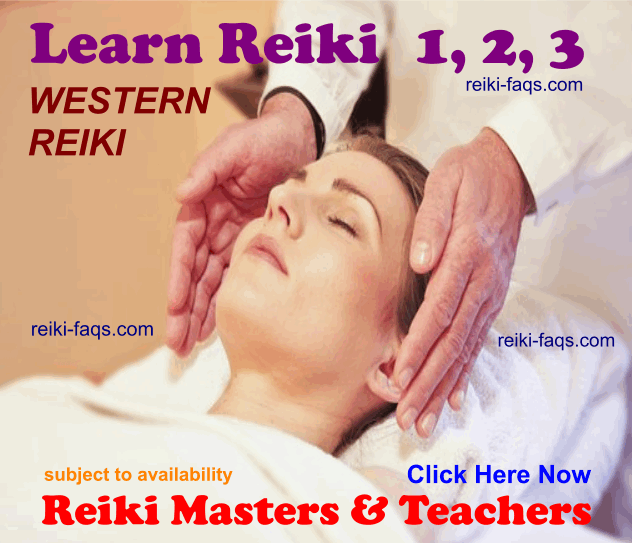Reiki Courses and Reiki Training Dates
2020: London UK
Reiki Courses and Reiki Training Dates
2020 Portugal
Reiki Courses and Reiki Training Dates
2020: Spain

What Is Reiki?
Does Reiki
really work?
An Introduction
to Reiki
Why Learn
Reiki? Who should learn Reiki?
Reiki in the
news ...
More Reiki news
and updates...
Reiki Level 3
Master and Teacher Training and Certification ...
Reiki Level 2
Training and Certification ... course, workshop ...
Reiki Level 1
Training and Certification ... course, workshop ...
Reiki Course
... Training Requirements ...
How long does
it take to complete Reiki Training?
Reiki Training
... minimum age requirements ...
Reiki Training
... what to wear ...
The 5 Reiki
Principles
One
of the Reiki Principles - For Today, Do Not Be Angry. Now, research proves the validity of
that important precept.
Fivefold
increased risk for heart attack after angry outburst
The study results showed that the risk of heart attack or
acute coronary syndrome, the symptoms like chest pain,
shortness of breath or sweating related to a blocked artery
was 4.7 times higher in the two hours following an angry
outburst than at any other time. And the risk for stroke
caused by a blocked artery in the brain was 3.6 times higher
than at other times. One of the studies included in the
review indicated a 6.3 fold increased risk for brain
aneurysm in the hour following an outburst of anger compared
with other times. BIDMC. European Heart Journal.
032014
Reiki Symbols
...
Reiki
Attunement in person or at a distance?
Free Reiki
Treatment or Free Reiki Attunements ...
Reiki Massage
Tables and Therapy Chairs ...
Online and
Distance Learning Courses and Reiki Attunements ...
Must I complete
my Reiki training with the same Reiki Master and
Teacher?
Reiki by any
other name ...
Is There
Transference and Energy Drain During a Reiki Session?
Do I really
need a Reiki Master and Teacher to teach me Reiki?
Reiki Teacher
Supplies, Reiki Certificates ...
Reiki Clothing
... what to wear as a Reiki Practitioner?
Do you need to
undress for Reiki Treatment?
Reiki with
negative intentions?
Reiki Treatment
- how long, how many sessions?
Do I have to be
"religious" or "spiritual" to benefit from Reiki (as a
receiver or a practitioner)?
Reiki Courses
Palm Springs, CA, Palm Desert California
Should a Reiki
Practitioner or Reiki Master diagnose an illness or
disease?
Learning Reiki
in big classes or smaller classes?
Reiki Distance
Healing, Absent Healing, Reiki Healers ...
Reiki Hospital
Outreach Program, Community Health Outreach and Pro-bono
Reiki Workshops
Malaga Reiki,
Reiki Master and Teacher teaches ...
Meditation ...
Reply to
prospective Reiki Student
More Reiki
questions and answers ...
Complementary Medicine Clinic,
Holistic Wellness Clinic
If
you want to organise a group of 5 or more Reiki students,
we may be able to provide training in your area by
special arrangement. Please contact us with your details /
requirements.
Brent
Cross Reiki Courses and Classes
Colindale Reiki
Courses and Classes
Costa
De La Luz, Spain Reiki Courses and Classes
Edgware Reiki Courses
and Classes
Finchley Reiki Courses and Classes
Harrow Reiki Courses
and Classes
Hendon Reiki Courses
and Classes
Kenton Reiki Courses
and Classes
Kilburn Reiki Courses
and Classes
Kingsbury Reiki
Courses and Classes
La
Manga, Murcia, Spain Reiki Courses and Classes
Lisbon, Lisboa, Portugal Reiki Courses
and Classes
Madeira, Funchal Reiki
Courses and Classes
Malaga, Spain Reiki
Courses and Classes
Malta Reiki Courses
and Classes
Mill Hill Reiki
Courses and Classes
Peniche, Portugal Reiki Courses and
Classes
Queensbury Reiki
Courses and Classes
Santa Cruz, La Palma,
Canaray Islands, Reiki Courses and Classes
Wembley Reiki Courses
and Classes
West
London Reiki Courses and Classes
In
the news ...
BBC Mastermind
had a question on Reiki - Energy Medicine
that uses hands on or hands off healing.
Stress
management. "It is well-known that stress impacts
quality of life and is a risk factor to our health," said
Nastaran Ahmadi, PhD, of the Yazd Cardiovascular Research
Center at Shahid Sadoughi University of Medical Sciences.
"We aimed to determine what kinds of coping strategies
patients were using to see if there were differences between
our patients who have had acute myocardial infarction and
those who have not." American College of Cardiology
Cellular
Stress and disease. Disruptions in a protein folding
process occurring in the brain, known as endoplasmic
reticulum (ER) stress, may cause non-alcoholic fatty liver
disease, independent of other factors. "Nearly 75 percent of
obese adults experience non-alcoholic fatty liver disease.
However, its underlying causes are unclear," said Colin
Young, Ph.D., senior author and assistant professor of
pharmacology and physiology at the GW School of Medicine and
Health Sciences. "Recent findings have pointed to ER stress
as central to its development. What our research shows is
that ER stress in the brain is a key contributor."
Non-alcoholic fatty liver disease impairs normal liver
function and is linked to other diseases such as diabetes
and cardiovascular disease. George Washington University. Journal
of Clinical Investigation Insight
Moments of
acute stress. Chronic psychosocial and emotional
stress has well-documented negative effects upon the human
immune system, measurably increasing the risk of disease.
"In our everyday lives, acute stress is manageable and does
not cause physiological damage," said study co-author Brinda
Rana, PhD, associate professor in the Department of
Psychiatry at UC San Diego School of Medicine. "However, for
those who experience it frequently, it can be a risk for
chronic diseases and disorders, such as cardiovascular and
immune modulated inflammation. And since the health of the
immune system is crucial to protection against pathogens and
other diseases, it's important to understand the impact of
stressful life events on the ability of our immune system to
properly do its job." University of California, San Diego
School of Medicine, Stony Brook University in New York. Brain,
Behavior and Immunity
The healing
powers of music - The music of Mozart and Strauss is
able to lower blood lipid concentrations and the heart rate.
This is the result of a study of the effect of different
musical genres on the cardiovascular system. Classical music
by Mozart and Strauss notably lowered blood pressure and
heart rate, whereas no substantial effect was seen for the
songs of ABBA. In the control group, resting in a supine
position also resulted in blood pressure lowering, but the
effect was far less pronounced than for exposure to the
music of Mozart or Strauss. All musical genres resulted in
notably lower cortisol concentrations. As far as cortisol
concentrations were concerned, the sex of the participants
must have played a part, because the drop in cortisol levels
was more pronounced in men than in women, especially after
exposure to the music of Mozart and Strauss. Comparison with
the control group showed that the effect of music was far
greater than that of silence. Hans-Joachim Trappe und
Gabriele Volt of Ruhr University Bochum. Deutsches
√Ąrzteblatt International
Stress
management and long-term health - Reacting positively
to stressful situations may play a key role in long-term
health. researchers found that adults who fail to maintain
positive moods such as cheerfulness or calm when faced with
the minor stressors of everyday life appear to have elevated
levels of inflammation. Furthermore, women can be at
heightened risk. Inflammatory responses are part of the
body's ability to protect itself via the immune system.
However, chronic -- long-term -- inflammation can undermine
health, and appears to play a role in obesity, heart
disease and cancer. These findings add to growing body
of evidence regarding the health implications of affective
reactivity - emotional response - to daily stressors. Penn
State, Cornell University. Health Psychology
Reducing
stress "We wanted to develop a treatment intervention
that taps into cultural beliefs and values that we
hypothesized would make the treatment more engaging and
relatable to many ethnic minorities that do not necessarily
embrace the current mental health care system, said Amy
Weisman de Mamani, Ph.D., associate professor of psychology
in the UM College of Arts and Sciences and principal
investigator of the study. "We hoped to develop a treatment
that was not only aimed at benefiting patients, but
explicitly focused on reducing caregiver distress as well."
In the spirituality module, the study aimed at helping
families' access beliefs and practices that could help
cope with the illness, such as prayer, meditation,
volunteerism, and attending religious services. Family
members that did not subscribe to any particular religious
practice or belief participated in parallel exercises that
didn't specifically reference "God" or "religion."
University of Miami. Psychotherapy
Low back pain
risk factors - New research identifies nicotine
dependence, obesity, alcohol abuse and depressive disorders
as risk factors for low back pain, a common condition
causing disability, missed work, high medical costs and
diminished life quality. For many adults, low back pain is
debilitating and chronic. Determining modifiable risk
factors for low back pain could help avoid or diminish the
financial and emotional costs of this condition. American
Academy of Orthopaedic Surgeons
Stress and
obesity - Adolescent obesity is a national public
health concern and, unchecked, places young people on a
trajectory for a variety of health issues as they grow
older. A study suggests there is a relationship between
long-term exposure to three specific types of family
stressors and children becoming obese by the time they
turn 18 years old. "Experiencing family stress -
specifically family disruption and financial stress -
repeatedly throughout childhood was associated with
overweight or obesity by the time adolescent girls turned
18," Assistant Professor Daphne Hernandez said.
Interestingly, only one chronic family stress point
-maternal poor health -was related to boys becoming
overweight or obese by the time they turned 18. "These
programs need to take a broader approach to combatting
obesity by helping families experiencing these kinds of
stressors find access to mental health programs, financial
assistance or family counseling," she said. "Developing
strategies to help with family stressors during childhood
may help children maintain healthy weight into adulthood."
University of Houston Department of Health and Human
Performance (HHP) and Texas Obesity Research Center (TORC).
Preventive Medicine
A grateful
heart is a healthier heart - Recognizing and giving
thanks for the positive aspects of life can result in
improved mental, and ultimately physical, health in patients
with asymptomatic heart failure. "We found that more
gratitude in these patients was associated with better mood,
better sleep, less fatigue and lower levels of inflammatory
biomarkers related to cardiac health," said lead author Paul
J. Mills, PhD, professor of family medicine and public
health at the University of California, San Diego.
Gratitude is part
of a wider outlook on life that involves noticing and
appreciating the positive aspects of life. It can be
attributed to an external source (e.g., a pet), another
person or a non-human (e.g., God). It is also commonly an
aspect of spirituality, said Mills. Because previous
research has shown that people who considered themselves
more spiritual had greater overall well-being, including
physical health, Mills and his colleagues examined the role
of both spirituality and gratitude on potential health
markers in patients.
Using standard
psychological tests, the researchers obtained scores for
gratitude and spiritual well-being. They then compared those
scores with the patients' scores for depressive symptom
severity, sleep quality, fatigue, self-efficacy (belief in
one's ability to deal with a situation) and inflammatory
markers. They found higher gratitude scores were associated
with better mood, higher quality sleep, more self-efficacy
and less inflammation. Inflammation can often worsen heart
failure.
"The Role of
Gratitude in Spiritual Well-Being in Asymptomatic Heart
Failure Patients," by Paul J. Mills, PhD, and Deepak Chopra,
MD, University of California, San Diego, and Chopra Center
for Wellbeing, Carlsbad, California; Laura Redwine, PhD,
Kathleen Wilson, MS, Meredith A. Pung, PhD, Kelly Chin, BS,
Barry H. Greenberg, MD, Ottar Lunde, MD, Alan Maisel, MD,
and Ajit Raisinghani, MD, University of California, San
Diego; and Alex Wood, PhD, University of Stirling. Spirituality
in Clinical Practice. American Psychological
Association
Listen to your
heart - Dr Tristan Bekinschtein, a Wellcome Trust
Fellow and lecturer in the Department of Psychology at the
University of Cambridge, says: "'Follow your heart' has
become something of a cliché, but we know that, consciously
or unconsciously, there is a relationship between our
heartrate and our decisions and emotions. There may
well be benefits to becoming more attuned to our heartbeat,
but there's very little in scientific literature about
whether this is even technically possible." Changing
heartrate is part of our automatic and unconscious 'fight or
flight' response - being aware of the heart's rhythm could
give people more control over their behaviour, believe the
researchers. Volunteers took part in an experiment during
which scientists measured their brain activity using an
electroencephalograph (EEG). Dr Bekinschtein
adds, "There are techniques such as mindfulness
that teach us to be more aware of our bodies, but it will be
interesting to see whether people are able to control their
emotions better or to make better decisions if they are
aware of how their heart is beating." University of
Cambridge and the Medical Research Council (MRC) Cognition
and Brain Sciences Unit, Cambridge. Cerebral Cortex
Meditation
might slow the age-related loss of gray matter in the
brain - A study found that meditation appeared to help
preserve the brain's gray matter, the tissue that contains
neurons. "We expected rather small and distinct effects
located in some of the regions that had previously been
associated with meditating," said Dr. Florian Kurth.
"Instead, what we actually observed was a widespread effect
of meditation that encompassed regions throughout the entire
brain." University of California - Los Angeles.
Frontiers in Psychology
Hiding your
true colors? Research suggests that our drive for
authenticity - living in accordance with our sense of self,
emotions, and values - may be so fundamental that we
actually feel immoral and impure when we violate our true
sense of self. This sense of impurity, in turn, may lead us
to engage in cleansing or charitable behaviors as a way of
clearing our conscience. "Our work shows that feeling
inauthentic is not a fleeting or cursory phenomenon -- it
cuts to the very essence of what it means to be a moral
person," explains psychological scientist Maryam Kouchaki of
the Kellogg School of Management at Northwestern University.
Psychological Science
Links between
sleep loss and diabetes - Lack of sleep can elevate
levels of free fatty acids in the blood, accompanied by
temporary pre-diabetic conditions in healthy young men. "At
the population level, multiple studies have reported
connections between restricted sleep, weight gain, and type
2 diabetes," said Esra Tasali, MD, assistant professor of
medicine at the University of Chicago. Diabetologia
Stress
management techniques improve long-term mood and quality
of life - A study shows that providing women with
skills to manage stress early in their breast cancer
treatment can improve their mood and quality of life many
years later. Researchers found that the women who received
the stress management intervention had persistently less
depressive symptoms and better quality of life up to 15
years later. "Because depressive symptoms have been
associated with neuroendocrine and inflammatory processes
that may influence cancer progression, our ongoing work is
examining the effects of stress management on depression and
inflammatory biomarkers on the one hand, and disease
recurrence and survival on the other," said Dr. Michael
Antoni. University of Miami (UM) College of Arts &
Sciences. American Cancer Society, Cancer
Anxious people
more apt to make bad decisions amid uncertainty - Highly
anxious people have more trouble deciding how best to handle
life's uncertainties. They may even catastrophize,
interpreting, say, a lovers' tiff as a doomed relationship
or a workplace change as a career threat. University of
California - Berkeley and University of Oxford. Nature
Neuroscience
Pain affects
sleep - Pain is a key factor in the gap between the
amount of sleep people say they need and the amount they're
getting - an average 42 minute sleep debt for those with
chronic pain and 14 minutes for those who've suffered from
acute pain in the past week. About one in three of those
with no pain don't always or often get a good night's
sleep or the sleep they need to feel their best, or
have had trouble falling or staying asleep in the past week.
Those problems rise even higher among individuals who do
have chronic or acute pain. Pain joins two related
concerns - stress and poor health - as key
correlates of shorter sleep durations and worse sleep
quality. "Clinicians and pain sufferers know that pain and
sleep problems present together and aggravate each other.
This poll confirms the relationship between pain and sleep.
Fortunately, it also shows that simple steps to
improving sleep can be beneficial," said Dr. Timothy
Roehrs, PhD, Henry Ford Hospital. National Sleep Foundation
Stress -
"It's clear that treating mental illness is generally
ineffective and, as with other branches of medicine, that
the best strategy is to prevent illness in the first place,"
says cognitive neuroscientist and senior author Dr. Ahmad
Hariri. "Our findings contribute to ongoing efforts to
develop strategies for preventing mental illness by
identifying a measure of brain function that distinguishes
those at greatest risk before they become ill." Duke
University. Neuron
Stress
- Feeling stressed may prompt you to go to great lengths to
satisfy an urge for a drink or sweets, but you're not likely
to enjoy the indulgence any more than someone who is not
stressed and has the same treat just for pleasure. "Stress
plays a critical role in many psychological disorders and is
one of the most important factors determining relapses in
addiction, gambling and binge eating," said Tobias Brosch,
PhD. "Stress seems to flip a switch in our functioning ..."
University of Geneva. American Psychological Association.
Journal of Experimental Psychology: Animal Learning and
Cognition.
Longer work
hours for moms - The majority of preschoolers may not
be getting the amount of sleep they need each
night, placing them at higher risk of being overweight
or obese within a year. "We think that it might be
the more hours that mothers are working, the less time they
have, and there may be some sort of tradeoff going on, 'Do I
spend quality time with my child or do we get to bed
early?'" Speirs said. "And then in the morning, when mothers
leave for work, their children also wake up early to get to
day care." University of Illinois at Urbana-Champaign.
Sleep Medicine
Wild
blueberries (bilberries) can help - Eating bilberries
diminishes the adverse effects of a high-fat diet. Low-grade
inflammation and elevated blood pressure are often
associated with obesity-related diseases. Bilberries
constitute an integral part of the Nordic diet and they
could be better utilized also elsewhere in the world.
Bilberries are associated with several beneficial health
effects and their use involves plenty of traditional wisdom.
The beneficial health effects of bilberries are thought to
be explained by polyphenols, especially anthocyanins, the
levels of which are significantly higher in bilberries than
in commercially cultivated blueberries. University of
Eastern Finland.
Clinicians
make more money by ordering more procedures per patient
- Higher-earning clinicians make more money by ordering more
procedures and services per patient rather than by seeing
more patients, which may not be in patients' best interest.
"Our findings suggest a weakness in fee-for-service
medicine," said Dr. Jonathan Bergman, an assistant professor
of urology and family medicine at the David Geffen School of
Medicine at UCLA and an urologist and bioethicist. "Perhaps
it would make more sense to reimburse clinicians for
providing high quality care, or for treating more patients.
There probably shouldn't be such wide variation in services
for patients being treated for the same conditions."
University of California - Los Angeles Health Sciences.
JAMA Internal Medicine.
Mental
disorders due to permanent stress - The team focused
mainly on a certain type of phagocytes, namely microglia.
Under normal circumstances, they repair synapses between
nerves cells in the brain and stimulate their growth. Once
activated, however, microglia may damage nerve cells and
trigger inflammation processes. The studies carried out in
Bochum have shown that the more frequently microglia get
triggered due to stress, the more they are inclined to
remain in the destructive mode - a risk factor for mental
diseases. Not every individual who is under permanent stress
will develop a mental disorder. Ruhr-University Bochum.
Integrative
medicine relieves pain and anxiety for cancer inpatients
- Pain is a common symptom of cancer and side effect of
cancer treatment, and treating cancer-related pain is often
a challenge for health care providers.
"Following Integrative medicine interventions, such as
medical massage, acupuncture, guided imagery or relaxation
response intervention, cancer patients experienced a
reduction in pain by an average of 47 percent and anxiety
by 56 percent," said Jill Johnson, Ph.D., M.P.H., lead
author and Senior Scientific Advisor at the Penny George
Institute. "The size of these reductions is clinically
important, because theoretically, these therapies can be as
effective as medications, which is the next step of our
research," said Jeffery Dusek, Ph.D., senior author and
Research Director for the Penny George Institute. The Penny
George Institute for Health and Healing. Journal of the
National Cancer Institute Monographs.
Telephone
support (distant support) program beneficial - A
support program administered entirely by telephone can
significantly reduce depression and other symptoms in
informal caregivers, such as family or friends, of
individuals with dementia.
"Those caring for
people with Alzheimer's disease or other forms of dementia
are often under a great deal of pressure," said principal
investigator Geoffrey Tremont, Ph.D, of the division of
neuropsychology in the department of psychiatry at Rhode
Island Hospital. "This pressure and stress can lead to
depression in the caregiver, or to negative reactions, or
even to behavior problems exhibited by the individual with
dementia." He continued, "Many of these caregivers have
trouble finding time to take care of themselves, allowing
their own physical and mental health issues to fester. By
providing these caregivers with the option of a
telephone-based support program, we are able to bring the
help right to them, rather than requiring the caregivers to
take time away from their loved one to attend a support
group or other appointment."
While previous
studies have shown that caregivers benefit from programs
such as in-person support/group therapy sessions, this is
the first such study to present data supporting a program
that is delivered only by telephone. Rhode Island Hospital.
Alzheimer's & Dementia.
|






